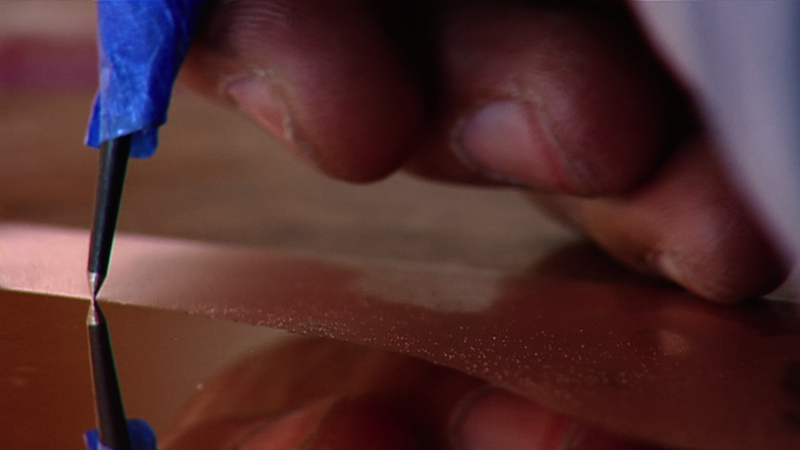
Detail of Martin Puryear working at Paulson Bott Press in Berkeley, CA. Production still from the series Exclusive. © Art21, Inc. 2013. Cinematography by Bob Elfstrom.
When I learned of the theme for this first issue of the Art21 Magazine, I knew exactly what I wanted to do: ask students what they think it takes to become an artist. Enlisting the help of my colleagues and Art21 Educators Don Ball, Jack Watson, Maureen Hergott, and Julia CopperSmith, we polled K-12 students in New York City, Chicago, North Carolina, and Ontario. Here’s how they responded.
Kindergarten and Elementary School
Younger children, especially early elementary students, seem to focus on what artists do. But as students make their way through elementary school, their answers tend to focus on creativity and the importance of practice.
“Drawing. A lot of drawing.” —Kris, 6
“You make lots of different things…and then become famous.” —Charles, 7
“When you go to school and learn to draw.” —Susan, 7
“You make an invention…and keep making inventions.” —Paul, 8
“You have to be creative and think before you draw.” —Chris, 9
“Practice. Practice. Because practice makes you better.” —Franco, 9
“You become an artist by practicing and by using your imagination.” —Dayana, 10
“By being creative and thinking as much as you can.” —Mariela, 10
“By following in the steps of other artists.” —Gabriel, 10
Middle School
Middle school students zoomed in on (surprise, surprise) the idea of the artist as celebrity, or someone who is purposely “different” from others in order to gain recognition.
“You definitely have to act like an artist.” —Cheryl, 12
“You have to love making art all the time.” —Damian, 13
“If you keep practicing, you can get really good at drawing. Then someone wants to buy your work. You are an artist if you make money at drawing.” —Ian, 13
“Maybe someone can become an artist by making people look at their work. The work has to be really weird and different.” —Owen, 13
“You become an artist through publicizing yourself.” —Kate, 12
High School
Students in high school were our largest pool of respondents. While they generally gave answers popular with elementary and middle school students, many of them also brought up the need for “passion.” Some of them told us not what an artist is but what an artist isn’t or how one doesn’t become an artist.
“An artist is someone who is creative and doesn’t give up on their work.” —Jane, 15
“No one can become an artist; people just are. If you are not born with the passion and desire that is required then you will never be an artist. But if you are then everything you do is art, no matter the medium.” —Fernando, 15
“A person should love art and often draw, paint, sculpt, or something else. You know someone is an artist when they are very passionate about their work and love what they do.” —Olivia, 15
“An artist isn’t someone who creates things because other people tell them to.” —Zoe, 15
“It takes more than the ability to draw, act, dance, make music, etc to become an artist. Rather than judging by talent, an artist needs to think artistically.” —Kelly, 16
“Having a sharp eye for beauty and being able to catch an idea and quickly put it down, I feel, is when someone becomes a true artist.” —Christopher, 15
“To become an artist you have to create things that come from your own creative mind.” —Haley, 16
“Someone becomes an artist by pursuing their passion and doing what they love. They practice to improve and never give up. An artist has a certain mind frame that enables him or her to look at things and therefore create masterpieces.” —Jade, 16
“How one becomes an artist is through interest, imagination, free time, and just having a good time doing art.” —Masihullah, 15
“One does not become an artist but is born an artist…Someone who is not passionate about art or cannot express him or herself is not meant to be an artist. It’s a discovery in oneself, not something you can become.” —Shveta, 15
“To be an artist you don’t need to be published or famous or have sold anything. All you need is to be passionate about something, whether it’s painting, cooking, or martial arts, and pursue it using your own creativity.” —Anonymous, 15
“A person becomes an artist when they share and communicate their thoughts and ideas to someone in a form that is not regular, casual, conversational speech.” —Khadija, 16
“People become artists by calling themselves one.” —Taryn, 16
“Someone becomes an artist through their creativity, imagination, and an open mind. An artist must experiment with different media, as well as come up with new ideas that make their work standout from other artists’ pieces…” —Claudia, 16
“Someone becomes an artist by creating artwork that is meaningful and relatable. People feel like they can connect to the work but also need to think about the meaning.” —Emily, 16
In the end, it seems that students go from a fairly specific picture of an artist as someone who does a lot of drawing, to a figure who is in some way publicly recognized, to someone who diligently pursues his or her work in order to achieve something meaningful.



